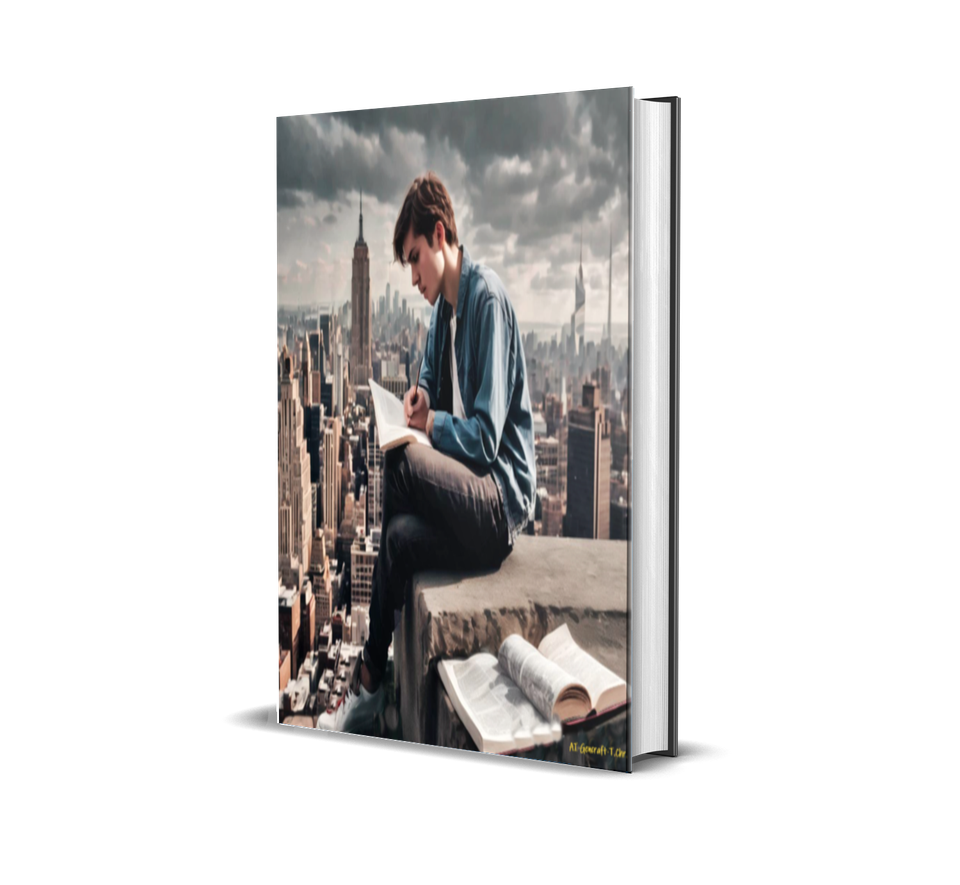The Keeper of the Wind

By AI-ChatGPT4o-T.Chr.-Human Synthesis-18 July 2025
Beginning the Journey
It was late October when I left the rest center upstate. The leaves were dying in those deep, fiery colors people pretend to love—red and orange like the world was bleeding quietly. I had my backpack, a notebook, and the wind at my back, which, I guess, made it easier to move forward, even if I didn’t feel ready.
They said I was “stable.” That’s the word they use when you stop talking about cliffs and start talking about plans. I didn’t tell them my plans were mostly made up.
New York hadn’t changed. It never does. It just keeps spinning with or without you. I found a cheap room above a bakery in Brooklyn that smelled like burnt sugar and yeast. It suited me. Mornings were noisy—kids with too-big backpacks, buses sneezing out black smoke, dogs barking at pigeons. I liked the chaos. It reminded me I was still real.
There was this center a few blocks down, where kids went after school. It wasn’t a glamorous place—just a couple of folding tables, some beanbags, and a dented foosball table. I wasn’t there to teach or fix anyone. I was just there.
Meeting Rina
The first week, no one talked to me except this girl named Rina who wore army boots and never made eye contact. She’d sit in the corner scribbling song lyrics in a ratty notebook. One afternoon, I asked what she was writing, and she looked up like I’d hit her. “Poems,” she said. “Not for you.”
Fair enough.
But the next day, she left the notebook half open on the table. And somehow, that was an invitation. The kids weren’t easy. They were quiet in loud ways. Angry in silent ways. But I recognized the feeling—like you’re stuck between childhood and the heavy machinery of adulthood, and no one gave you the manual.
I kept thinking about that stupid dream I used to have—the one where I stood in a field, catching kids before they ran off the cliff. Only now, I knew it didn’t work like that. People don’t fall all at once. They stumble in pieces. So maybe I wasn’t catching anyone. Maybe I was just walking beside them, making sure the wind didn’t push too hard. Maybe that was enough.
Rina’s Voice
They keep telling me to write about what hurts. That’s what Ms. Lively at school says. That’s what the internet says. That’s what people say when they don’t know what else to do with you. Write it down, Rina. Get it out.
So I do. But I don’t write the way they want. I write it sideways. Crooked. In pieces. That’s how Cal found me—bent over a torn-up notebook in the corner of the youth center with my earbuds in, pretending I didn’t notice anyone. I noticed him, though. Everyone did. He was tall and tired-looking, with that kind of face that’s seen too many broken things and doesn’t flinch anymore.
I thought he was another do-gooder. One of those people who wants to fix you so they can feel better about themselves. But he didn’t try to fix me. Not even once. He’d just sit on the floor like a weirdo and watch the room like he was keeping track of invisible things. Sometimes he brought snacks—always something dumb like off-brand cheese crackers. I started eating them anyway.
One day, he asked me what I was writing. I told him it wasn’t for him. And he said, “That’s okay. Just don’t stop.” That stuck with me for some reason.
The Open Mic
They gave me a chance to perform at the open mic night last Friday. Not the school one—that one’s full of drama kids and fake tears. This was at the community center a few blocks away. It was just a bunch of folding chairs, a broken mic stand someone taped up with neon duct tape, and kids trying to breathe without being noticed.
I hadn’t planned on reading. I told them I’d come “just to watch.” But I carried the new notebook Cal gave me, just in case. I don’t go anywhere without it now. It’s already starting to bend and crease in that comforting way notebooks do when they’re lived in.
I saw Cal sitting near the back. He wasn’t clapping for anyone—just watching, nodding when someone stumbled over their words, like he was helping them get through it with his silence. When they called my name, I froze.
It was like time folded in half and dropped me into the center. My heart was hammering so loud I could feel it in my teeth. Someone must’ve signed me up without asking—maybe Avery, maybe Cam. I almost walked out. Almost.
But then I looked at Cal. He didn’t wave. Didn’t nod. Didn’t smile like some proud parent or teacher. He just looked at me with this… calm. Like it was okay either way. Like I wasn’t going to disappear if I sat back down. Or if I stood up.
So I stood.
The notebook felt heavy in my hands as I walked up to the mic. My boots echoed on the wooden floor. I told myself no one cared. That they were too busy thinking about their own nerves or their own poems or whether the pizza was gone.
I flipped to a page about halfway through—one I hadn’t meant to read. One I’d written the night my mom didn’t come home. Again.
It was called “Bird Bones.”
Sometimes you grow hollow to fly,
but the sky doesn’t wait for you to figure out how wings work.
Sometimes you don’t fly at all— you just fall prettier than most.
That’s all it was. Four stanzas. No rhymes. No explanations. And when I looked up, no one clapped right away. Which felt like a punch to the stomach—until I realized they weren’t clapping because they were listening. Really listening.
Then the applause came—soft, respectful, kind of stunned. The way you clap when someone tells the truth too clearly for comfort. I looked at Cal again, but he wasn’t clapping either. He just looked at me like I’d done something brave and ordinary at the same time. And I swear—just for a second—I felt like maybe I was both.
Cal’s Winter
The kids at the center think I’ve got it all figured out. Not in the way they think of celebrities or heroes or people on the news. Just in that quiet, steady way—like I know where the map is, even if I never pull it out. But I don’t. Not really.
Some nights, after everyone’s gone, I stay behind and stack chairs slowly. One by one. Like it means something. Like it gives me time to breathe before going home to my one-room apartment with its humming radiator and that framed photo of Allie still sitting under the lamp.
She was my sister.
She died when I was fifteen. Fell through the cracks of a system that forgot she wasn’t just a chart, or a file, or a hard-to-place foster case.
I never told anyone at the center. Not even Rina. Especially not Rina.
Because if I said it out loud, it might become real again—and I’ve lived my whole life trying to keep that memory folded neatly at the bottom of a drawer.
But grief doesn’t stay folded. It seeps. Quietly. Like fog through window cracks. It shows up when you’re laughing too hard or staring at nothing. And lately, it’s been showing up more.
A few nights ago, I dreamed about her. Allie was sitting on the swings in Central Park, wearing a jacket too big for her and staring at the sky like she expected it to speak.
When I woke up, I couldn’t breathe. Not just from the dream. From the weight of all the things I never said. All the catching I never got to do.
The Quiet Confession
It was late afternoon at the center. The light was soft, slipping in through the cracked blinds and painting stripes across the floor.
Rina was there, doodling in her notebook like usual. This time, she didn’t look up when I walked in. Maybe she was used to me showing up late. Maybe she thought I was going to vanish again.
I sat down beside her, the old chessboard between us. For a long time, neither of us said anything. Then I pulled the letter from my jacket pocket—the one I’d written to Allie.
“Ever feel like the things you don’t say weigh heavier than the things you do?” I asked quietly. She didn’t answer at first. Just looked at the letter, then at me. “I get it,” she said finally. “Sometimes the silence is louder than the noise.”
So I told her.
About Allie. About the falling. About how sometimes being the catcher in the rye isn’t enough when you’ve got your own cliff to face.
She listened. No judgments. No advice. Just presence.
When I finished, she closed her notebook and smiled—the kind of smile that held storms and sunlight both.
“Thank you,” she said. “For trusting me.”
And I knew then that maybe healing doesn’t happen alone. Maybe it starts when you let someone else carry a little of your weight.
We sat there for a while, the wind rustling outside like a promise.
Poetic and Philosophical Overview:
What the Wind Taught Them.
The wind, like time, touches everything.
It doesn’t ask who you were, only whether you’ll listen. It taught Carl that healing isn’t neat—it’s messy, slow, and stitched with stories we often fear to tell.
It showed Rina that strength isn't silence but song—sung out even when the voice shakes.
Together, they learned that we don’t escape the edge by running from it.
We stay.
We wait.
We reach.
Each soul carries a piece of stillness the world forgot. Sometimes it takes another’s storm to find it.
In the end, to be the keeper of the wind is not to stop the fall—but to whisper, “I’ll sit with you while it passes.”
